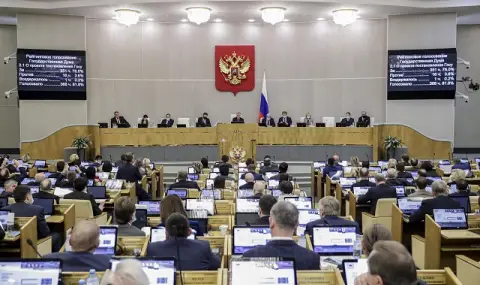Deputies from the lower house of the Russian parliament passed the first reading the draft law on the budget for 2025-2027, which foresees an increase in military spending by 30% for next year, reported France Presse, noting that the Kremlin continues the policy aimed largely at supporting the military campaign, writes BTA.
A total of 314 MPs voted "for", 78 abstained, and one voted "against", according to the official results. The second reading is scheduled for November 14. The text must also be approved by the upper house before being promulgated by President Vladimir Putin.
The Kremlin regularly reiterates that the attack on Ukraine, which began in February 2022, will be crowned with success, regardless of the economic and humanitarian cost and despite the West's support for Kiev, notes AFP. Vladimir Putin made it clear last month that "strengthening the country's defense capabilities" and the "integration of the regions" that Moscow claims to have annexed from Ukraine are priority tasks.
To this end, the Kremlin decided to invest heavily in the army. The defense expenditures provided for in the draft law will reach in 2025 over 13,500 billion rubles (130 billion euros at the current exchange rate). The national military budget has already grown by nearly 70% year-on-year in 2024, with investment in security reaching 8.7% of GDP, according to Putin - a first in modern Russian history. From 2022, the Kremlin reoriented its economy primarily to the military campaign, rapidly developing the military-industrial complex. The Russian leadership foresees a prolonged conflict with Ukraine and does not seem concerned about the risks of its economy becoming more dependent on military procurement, even though inflation of more than 8.6% is reducing the purchasing power of Russians, notes AFP.
The internal security budget, which includes the police and special services responsible for dealing with Kremlin critics, will rise to 3,460 billion rubles (33 billion euros), representing almost 10 percent of the Russian government's annual spending. In total, about 40% of the budget will be allocated to defense and security, not to mention a number of classified expenses.
In a sign that military spending will not decrease, Vladimir Putin signed a decree in the middle of last month ordering a 15 percent increase in the number of troops to 1.5 million. With this, one out of every 50 workers in Russia will now be in the army, which, according to Russian media, will become the second largest in the world after China's.
In order to more effectively manage the finances of the army, where corruption remains rife, Vladimir Putin removed a number of officials who had been jailed on bribery charges, and in May appointed economist Andrey Belousov to head the Russian ministry of defense.
In total, in 2025, federal spending will rise to a total of 41,500 billion rubles (about 400 billion euros). To balance its growing budget, the government plans to increase taxes on high incomes and businesses from January 1 as a way to continue funding the offensive in Ukraine and related spending.
However, the structural problems in the economy persist - in addition to inflation, the labor shortage, which is a direct consequence of the departure of hundreds of thousands of men to the front or abroad, remains and "restricts" growth, according to Vladimir Putin's own admission.
However, the situation remains acceptable in the short term. In fact, on Tuesday the IMF raised its forecast for Russia's year-end growth to 3.6%.
